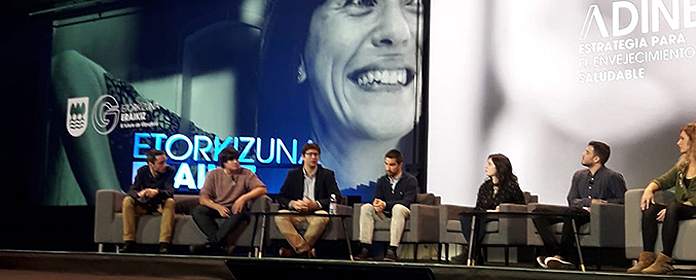News
LATEST NEWS AND EVENTS FROM THE SCHOOL OF ENGINEERING
Former student Nacho Reina develops a robot that improves the movement and muscle tone of the elderly.
The biomedical engineer explained what his project Master's Thesis consists of at congress Adinberri, organized by the Provincial Council.

Nacho Reina, (Tecnun'17), has recently participated in the congress Adinberri organized by the Provincial Council of Gipuzkoa along with other students from universities in the Basque Country. The biomedical engineer has shared with the attendees the essence of the project Master's Thesis he is developing in the company Gogoa Mobility Robots, in order to improve muscle tone and movement of people with muscle injuries.
"I am working, together with Matia Fundazioa, on the use of an exoskeleton called HANK, from 'hanka' in Basque. HANK financial aid in the rehabilitation of different pathologies or injuries that compromise the movement of patients, such as incomplete spinal cord injuries, tetrapresia or stroke."
The HANK robot, as detailed by Nacho Reina, is a joint project with Matia Fundazioa, and consists of a system with three joints - hip, knee and ankle of each leg - that move independently to simulate a natural step.
"The patient wears the robot, which is attached to the legs by means of magnetic fasteners, and is adjusted by means of straps and sliders to the patient's dimensions," the young man from San Sebastian continues with enthusiasm.
Reina also explains that HANK has a Bluetooth control system and a data collection system via WiFi: "The data allows us to know the angles of the joints over time, which serves as guide for the physiotherapist or doctor in charge of the patient to know objectively if the rehabilitation is going well".
Although it is still too early to speak of definitive results, the perception of Matia Fundazioa is that with the use of the exoskeleton the elderly improve their muscle tone. This is what one of the physiotherapists who participates in the program says, considering that "it is beneficial, since the exoskeleton does not make the total movement, but rather forces or financial aid the patient to maintain the correct posture".
At final, as he says, "he corrects their gait and, more importantly, financial aid helps them to internalize this new way of walking".
Nacho Reina emphasizes what for him is undoubtedly the most important aspect of this project: the patient's health: "Everything is aimed at improving their quality of life, so we also give them questionnaires to rate the level of effort, motivation or frustration they may have felt during the test".
"The best thing is that they are very motivated, they tell us that they notice a lot of improvement and we can see that they are happy. In addition, the physiotherapists and other staff of Matia corroborate the improvement, which makes us optimistic for the future".
It should be noted that Matia Fundazioa is also participating in this project capturing data on the gait of the participants generated by the sensors incorporated in the exoskeleton for subsequent analysis, as well as a clinical evaluation with a rehabilitation physician.
